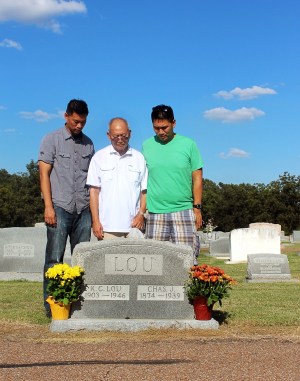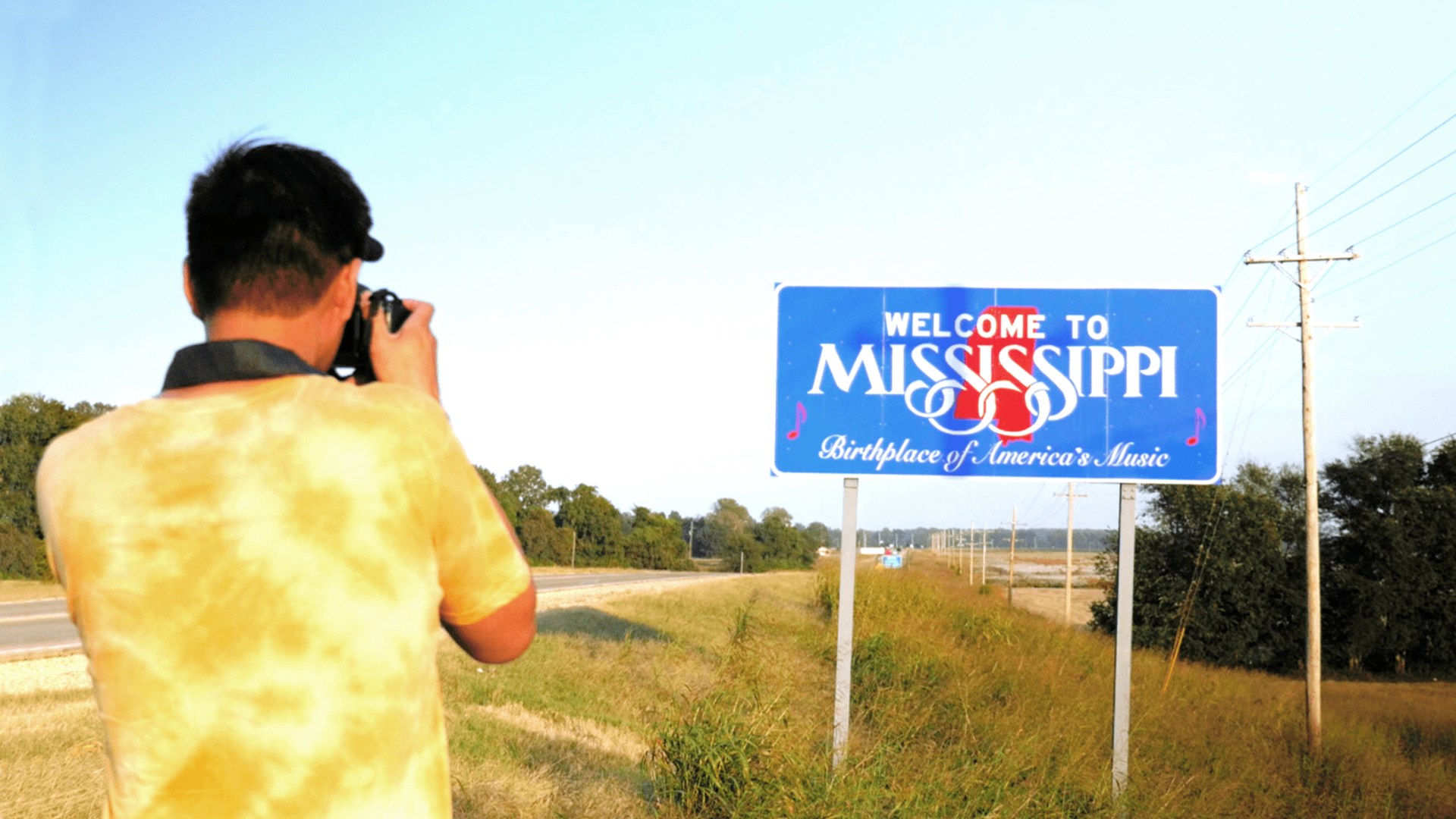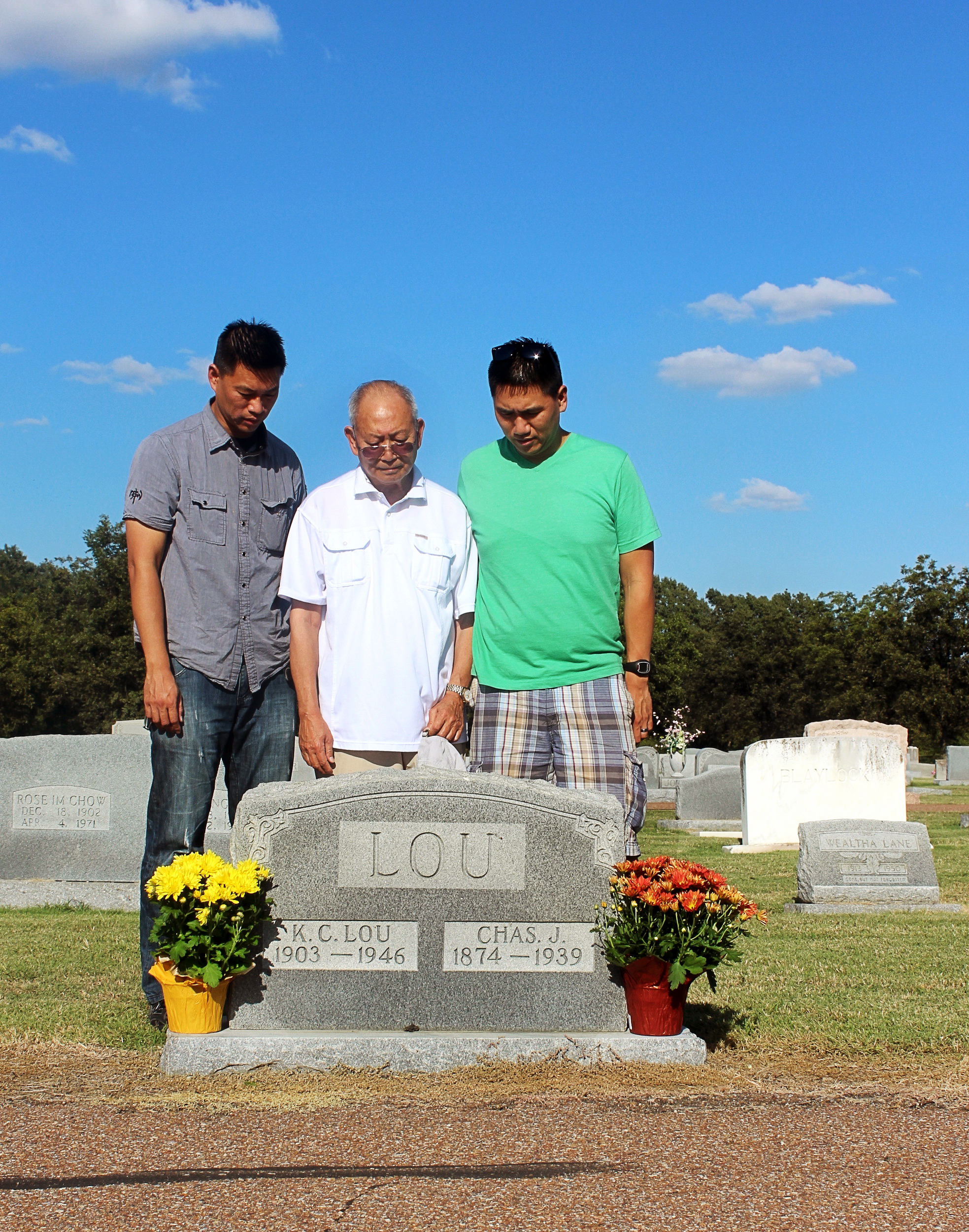What kind of accent is that?
People saw my Chinese face and heard my Texas drawl. And in their minds, it didn’t add up, even though my family had been in the United States for three generations. But I was proud of my Southern accent and my family’s story in America that it contained.
I saw strong echoes of my family’s history in Far East Deep South (available on PBS.org, WorldChannel.org or the PBS app through June 3), a documentary that follows the Chius, a Chinese American family exploring their ancestors’ history in the Mississippi Delta.
At the start of the film, Baldwin and Edwin Chiu have little knowledge of their Southern history and their grandfather’s relationship to the white and Black communities. They travel as adults to the Mississippi Delta with their father, Charles Chiu, after learning that their grandfather, K. C. Lou, was buried in a small town along the river. They connect with locals who share stories and pictures of K.C. and historians who help paint the broader context of their family’s story.
Many of us have learned key details of family history as adults. Some older generations purposely hold onto secrets, not eager to relive shame, agony, or violence. Others don’t take intentional time to share. And yet, as my family, the Chois, and the Bible remind us, practicing vulnerability with our children and grandchildren is what enables us to tell the story of how God has worked through our lives and what enables our communities to heal.
Sharing a family’s history often means educating about the larger historical context that your ancestors waded through. In the case of the Chius, their great-grandfather, Chas J. Lou, was born in the US in 1877, eight years after thousands of Chinese laborers finished the transcontinental railroad and five years before the Chinese Exclusion Act went into effect, which banned nearly all immigration from China.
These political realities had very personal consequences. Because Chas was an American citizen and considered a merchant rather than a laborer, he was able to bring in his son, K.C., in 1919. But K.C. couldn’t bring his wife or their son, Charles, who were in China. (Charles ultimately did not arrive until 1952.) Not knowing his father’s story, Charles believed K.C. never cared about him. But in a poignant moment in the film, he learns his father once wrote to his friend, “I would give up 20 years of my life to have my kids with me.”
 Copyright 2021 Giant Flashlight Media
Copyright 2021 Giant Flashlight MediaWhile Americans are often surprised to find Chinese people in the South in the 19th century and early 20th century—the Chiu brothers themselves are astonished—many Chinese settled there after struggling to find work elsewhere. However, they quickly felt the scourge of Jim Crow laws. Southern states considered Chinese immigrants “colored” and subjected them to the same discriminatory practices that African Americans experienced. Rather than self-segregate, the Chinese, including K.C., opened grocery stores and businesses in Black communities.
In the film, Baldwin and Edwin discover their grandfather was known for his generosity and beloved by the Black community. A former customer comments that the Chinese businessman never looked down on the Black community or made them feel like second-class citizens. Instead, K.C. extended lines of credit to his customers, some of them sharecroppers who were paid only when the crops were brought in annually.
Unlike the Chius, I learned about my family’s Southern history from a young age, partially because I was born and raised in Houston. My grandfather, Jim Toy Lee, was also a grocery store owner in Mississippi, arriving in California about 100 years ago. My great-grandfather, Hoy Cal Jee, had emigrated from China to San Francisco in the early 1900s.
In 1906, the infamous San Francisco earthquake caused fires that destroyed more than 500 buildings, as well as all immigation and birth records. The disaster presented an opportunity for immigrants to claim citizenship by declaring they had been born in San Francisco. Hoy Cal took advantage of this and received US citizenship. Though the majority of Chinese people had been banned from immigrating to the US for nearly 30 years, there was one exception: US citizens could naturalize their children born in China. Although immigration officials vetted these claims, many “paper sons” also slipped through, which is how my grandfather, Jim Toy, and my “uncle” Yett Gee became US citizens upon entry in 1920.
Several years after arriving in the US, Jim Toy traveled back to China and returned with my grandmother, Bow Sim, and their son, Hugh. The family moved from San Francisco to Chicago, and finally to Ruleville, Mississippi, a small farming town established following the construction of the Yazoo and Mississippi Valley Railroad. Jim Toy was able to work in a grocery store with his “paper brother,” Yett Gee. Like K.C., Jim Toy was classified as “colored” and had limited job and education opportunities. Frustrated that his son, Hugh, would be forced to attend a segregated school and worried he would receive an inferior education, Jim Toy moved his growing family to Houston around 1937. Most Chinese became merchants in Black neighborhoods, but Jim Toy purposely chose to open a grocery store in a white neighborhood so his kids could have more opportunities.
Learning these stories as a child made me appreciate both the hard work of my family and the sacrifices one generation made for the next. But like Charles, Baldwin, and Edwin, as an adult, I am still discovering new things and asking more questions. (While writing this essay, I interviewed two of my aunts and another cousin who told me even more family stories.)
As the documentary suggests, when our parents are slow to reveal or are secretive about the details of their lives, we can end up believing that these histories don’t matter or the past is in the past. But through its numerous genealogies; frequent invocations to the God of Abraham, Isaac, and Jacob; and rituals specifically commemorating a particular triumph, Scripture strongly suggests that God wants us to remember where we come from. As the Bible makes clear, these aren’t just interactions of people in years past—they’re a testament to God’s work and blessings in the world.
At the beginning of the Book of Joshua, the successor to Moses has recently assumed leadership over the Israelites and leads the nation to cross the River Jordan after God miraculously stops the water from flowing. With the water held back, the Lord has Joshua direct 12 men to collect 12 stones in the river and build a monument: “In the future, when your descendants ask their parents, ‘What do these stones mean?’ tell them, ‘Israel crossed the Jordan on dry ground.’ For the Lord your God dried up the Jordan before you until you had crossed over. The Lord your God did to the Jordan what he had done to the Red Sea when he dried it up before us until we had crossed over. He did this so that all the peoples of the earth might know that the hand of the Lord is powerful and so that you might always fear the Lord your God” (Joshua 5:21–24).
Crossing the River Jordan means that after centuries of enslavement and decades wandering in the desert, the Israelites are finally in the Promised Land. God has made good on his promise to them. This monument becomes a means of helping them retain and care for their spiritual heritage.
In my parents’ stories, I’m grateful that they didn’t hide the hardships their family endured. Upon my grandparents and their children moving to Houston, they opened a grocery store in the Heights, a white, blue-collar neighborhood. Residents boycotted the Chinese-owned store until their World War II ration coupons compelled them to enter the establishment. My mother told me that for more than half a decade, their family was banned from owning a home in the neighborhood, forcing them to live in the back storeroom, eating dinner and doing homework on apple crates.
After six years, a white customer helped the family buy a home by first purchasing it himself and immediately selling it to my grandparents. Little did he know that he was helping the family that would raise the first Asian American on the Houston City Council and first Asian American woman in the Texas House of Representatives—otherwise known as my mom.
This past year has been a hard one for many Asian American communities. Each week seems to bring new stories of violence and assault, incidents that many of us will feel reluctant to remember and pass down to one another. And yet, our wounds and joy, our trauma and triumph all matter to God, as Psalm 107:2–3 underscores, “Let the redeemed of the Lord tell their story—those he redeemed from the hand of the foe, those he gathered from the lands, from east and west, from north and south.”
“Sometimes we think about testimony as being something purely personal,” Far East Deep South director Larissa Lam, who turned her husband Baldwin’s family story into the film, told CT. “However, if we take a step back, we may begin to recognize how God has been with one’s family for generations.
“If you think about it, the Bible is made up of family stories,” she said. “If we don’t tell our family stories, then no one will learn about the trials and triumphs, stories of transgression to redemption in our families. God gave us all unique stories, and it’s up to us to tell it.”
Kim Wong Chew is a California-based writer.










